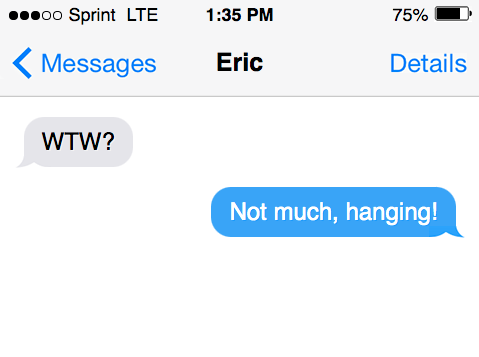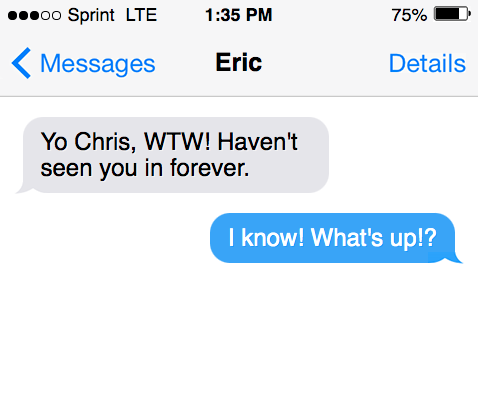What does “WTW” mean? Does it mean something inappropriate? Should it get used in business settings? When someone texts the internet slang acronym, “WTW.” What does it mean? The English language has undergone significant transformation thanks to the internet. In the digital world, communication is changing the way we look at English.
Learn what “WTW” means in this short guide…
“WTW” meaning and definition
“WTW” stands for, “What’s the word?” It is a way of saying hello. And asking a question to begin a conversation. Similar to someone asking, “What’s up?” Or, “What are you doing?”
The correct way to respond to “WTW” is to explain your current or future activities and plans. The intention behind the question is typically to inquire about hanging out or spending time together.

Capitalization
“WTW” is typically in ALL CAPS or all lowercase.
Correct: WTW
Correct: wtw
Incorrect: Wtw
Incorrect: WtW
Intention
- Inquisition
- Questioning
- Asking about current or future plans
- Invoke conversation
Usage
- Text messages: Group or individual chats.
- Video game chats: Chat rooms in role playing games.
- Dating applications: A conversation starter.
How to respond to “WTW” in a text
Here are examples of how to respond to “WTW” in a text message:
“I’m just here, hanging out. What are you up to?”
“Nothing really, would love to hang out. What are you doing?”
Other meanings
Less common meanings for this acronym:
- Worth The Wait
- Wissenschaftlich Technische Werkstätten (German: Scientific Technical Institute)
- Walk This Way
- Woman to Woman
- Walk Through Walls
- Welfare to Work
- Willis Towers Watson
- Well to Wheels (hybrid electric vehicle)
- Wrestle the World (Tom and Terry Brands, Iowa City, IA)
Look at the context of the conversation to understand the acronym’s intention. If a friend is asking, “WTW,” it usually stands for, “What’s the word?”

History of “WTW”
Urban Dictionary dates “WTW” back to 2016, making it one of the more recent internet slang acronyms to gain in popularity.
Examples of “WTW” getting used in a conversation
Here are examples of friends using “WTW” in a text conversation:
Example one
Friend 1: “WTW?”
Friend 2: “Nothing really, hanging out here at home. Basically, super bored. Do you want to hang out?”
This example shows two friends beginning a conversation using the “WTW” acronym. The second friend responds to the person by mentioning they would like to hang out.
Example two
Friend 1: “Anthony, WTW, I haven’t seen you in forever!”
Friend 2: “I know! It’s been way to long. We should hang out!”
The acronym can get used in a variety of ways. Including using it in the middle of a sentence to ask the person a question. It does not need to get used at the start or end of a sentence in order for it to have the same meaning.
Similar abbreviations
Similar abbreviations that are used between two friends.
WUP: Standing for, “What’s up?” Another way to ask someone to start a conversation.
SUP: Or, “What’s up?” An internet slang term to inquire about plans.
S^: Similar to “SUP” and using unique keystrokes to allude to the word, “up.”
W/U: Another way to say, “What’s up?”
Common FAQs
Questions and answers:
What does “WTW” mean on Snapchat, TikTok, or Twitter?
It means, “What’s the word?” It is used to a conversation starter. When two people want to start talking to each other.
It could be two users, people, friends, or acquaintances.
Sources
- What Does WU Mean? – Cyber Definitions
- wtw – Urban Dictionary
- Wtw Definitions | What does wtw mean? – YourDictionary
- #wtw – Tagdef
- WTW – Definition by AcronymFinder
Inside this article
Fact checked:
Content is rigorously reviewed by a team of qualified and experienced fact checkers. Fact checkers review articles for factual accuracy, relevance, and timeliness. Learn more.
Core lessons
Glossary
- Abstract Noun
- Accusative Case
- Anecdote
- Antonym
- Active Sentence
- Adverb
- Adjective
- Allegory
- Alliteration
- Adjective Clause
- Adjective Phrase
- Ampersand
- Anastrophe
- Adverbial Clause
- Appositive Phrase
- Clause
- Compound Adjective
- Complex Sentence
- Compound Words
- Compound Predicate
- Common Noun
- Comparative Adjective
- Comparative and Superlative
- Compound Noun
- Compound Subject
- Compound Sentence
- Copular Verb
- Collective Noun
- Colloquialism
- Conciseness
- Consonance
- Conditional
- Concrete Noun
- Conjunction
- Conjugation
- Conditional Sentence
- Comma Splice
- Correlative Conjunction
- Coordinating Conjunction
- Coordinate Adjective
- Cumulative Adjective
- Dative Case
- Determiner
- Declarative Sentence
- Declarative Statement
- Direct Object Pronoun
- Direct Object
- Diction
- Diphthong
- Dangling Modifier
- Demonstrative Pronoun
- Demonstrative Adjective
- Direct Characterization
- Definite Article
- Doublespeak
- False Dilemma Fallacy
- Future Perfect Progressive
- Future Simple
- Future Perfect Continuous
- Future Perfect
- First Conditional
- Irregular Adjective
- Irregular Verb
- Imperative Sentence
- Indefinite Article
- Intransitive Verb
- Introductory Phrase
- Indefinite Pronoun
- Indirect Characterization
- Interrogative Sentence
- Intensive Pronoun
- Inanimate Object
- Indefinite Tense
- Infinitive Phrase
- Interjection
- Intensifier
- Infinitive
- Indicative Mood
- Participle
- Parallelism
- Prepositional Phrase
- Past Simple Tense
- Past Continuous Tense
- Past Perfect Tense
- Past Progressive Tense
- Present Simple Tense
- Present Perfect Tense
- Personal Pronoun
- Personification
- Persuasive Writing
- Parallel Structure
- Phrasal Verb
- Predicate Adjective
- Predicate Nominative
- Phonetic Language
- Plural Noun
- Punctuation
- Punctuation Marks
- Preposition
- Preposition of Place
- Parts of Speech
- Possessive Adjective
- Possessive Determiner
- Possessive Case
- Possessive Noun
- Proper Adjective
- Proper Noun
- Present Participle
- Prefix
- Predicate



